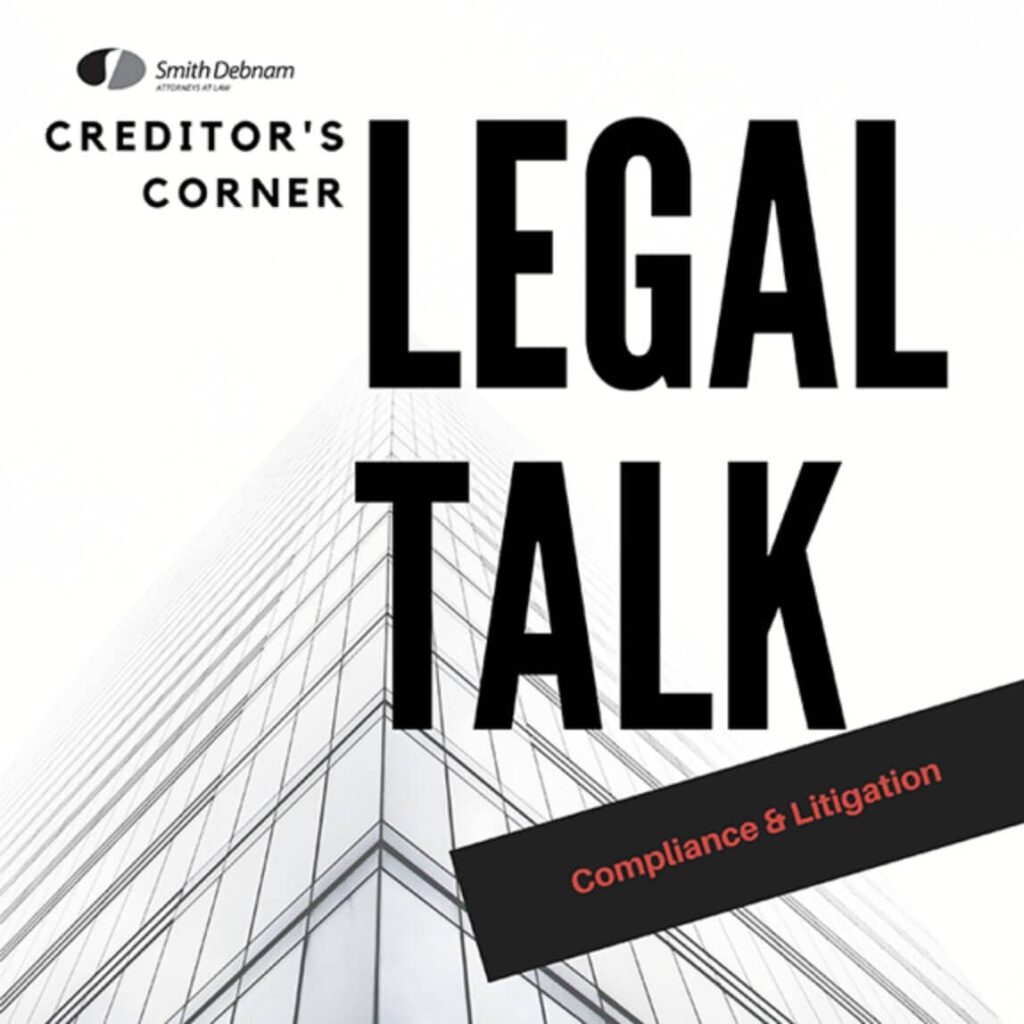Join attorneys Melissa Tula Smith and Rachel Rogers as they dive deep into the complex world of consumer collection law. This informative podcast breaks down key federal regulations like the FDCPA, TCPA, and FCRA, exploring the legal framework that protects consumers while allowing creditors to collect legitimate debts. Learn about communication restrictions, legal pitfalls, best practices, and state-specific nuances that every debt collector and legal professional should know. Whether you’re a lawyer, business owner, or simply interested in understanding debt collection regulations, this podcast offers crucial insights into maintaining ethical and compliant collection practices.


Creditors’ Corner: Navigating Consumer Collection Law
[00:00] Rachel Rogers: Foreign.
[00:22] Melissa Tulis Smith: Hello and welcome to the podcast series Creditors Corner Legal Talk, presented by Smith Debnum, Attorneys at Law, where we explore a range of legal topics impacting businesses and private individuals. So be sure to hit subscribe so you never miss an episode. My name is Melissa Tulis Smith and I’m an attorney in the firm’s Creditors Rights Section. Today’s topic is Understanding Consumer Collection Law and we’ll talk about key legal provisions that govern consumer collection laws. Before we begin, I want to note that the information provided in this podcast does not and is not intended to constitute legal advice. Instead, any and all information shared is for general informational purposes only. Listeners should contact their attorney to obtain advice with respect to any particular legal matter. With that out of the way now, let’s turn our attention to this week’s topic. With us today is Rachel Rogers, an attorney in the firm’s Creditors Rights Section.
[01:24] Rachel Rogers: Hello. Hello.
[01:26] Melissa Tulis Smith: Hey Rachel, thank you for being with us today. So, consumer collection law refers to the body of legal regulations surrounding debt collection. It’s a balance ensuring consumers are treated fairly while allowing creditors a lawful path to collect what they’re owed. This area of law encompasses a variety of protections against abusive, deceptive and unfair practices. On a quick note, some of these laws are in in a bit of a flux right now due to changes involving the Consumer Financial Protection Bureau, known as the cfpb. But today we’re just going to focus on the current and historically consistent legal framework.
[02:17] Rachel Rogers: Thanks Melissa, for starting us off. First, we’ll talk about the Fair Debt Collection Practices act, better known as the fdcpa. This is the most well known law in this area and it was enacted in 1977. The FDCPA governs third party debt collectors, which means those parties who aren’t part of the original transaction. The core mission of the FDCPA is to eliminate abusive, deceptive and unfair debt collection practices. Some of the key provisions of the FDCPA focus on communication restrictions. Debt collectors can’t call a consumer before 8am or after 9pm in that consumer’s time zone unless the consumer agrees. And if the consumer asks for the calls to stop, then the debt collector must comply. The FDCPA also has a key provision about harassment and abuse and it prohibits prohibits threats, the use of profane language, or repeated excessive calling. All of those actions are prohibited. There is a general rule, it’s referred to as a 777 rule, which kind of gives an outline for what constitutes repeated excessive calling. And so debt collectors are not allowed to call a consumer more than seven times in seven days about the same debt. So that’s a good rule to go by for debt collectors. Another key provision is regarding misrepresentation. And the FDCPA states that collectors can’t make false claims or threaten legal action that they don’t intend to actually pursue. The final key provision in the FDCPA deals with debt validation. And it requires that within five days of first contact with a consumer, collectors must send a written notice, including various things, but the amount owed and the name of the creditor. Violations of any of these key provisions or any of the FDCPA can result in lawsuits against the debt collector. And collectors may be liable for statutory and actual damages, plus attorney’s fees. So the risks are real.
[04:44] Melissa Tulis Smith: Absolutely. Something our clients and ourselves as attorneys who are engaging in the practice of debt collection should certainly be aware of. And I would note for our listeners that the FDCPA does in fact apply to attorneys and law firms that regularly collect the debt of others, so do be wary of its restrictions. Next up, we’ve got the Telephone Consumer Protection ACT or the TCPA. This one was passed in 1991 to protect consumer privacy from mostly from telemarketing. That was really the mission behind this. However it does, its scope does include also telephone calls from debt collectors. Some key provisions of the TCPA are the Do Not Call Registry. I’m sure you’ve heard of that. There’s a way you can put your number on the Do Not Call registry and collectors must respect it. It is essentially akin to a cease and desist request. I’ll say I put my cell phone number on the Do Not Call registry and not debt collectors. Fortunately, no debt collectors are after me, but I certainly get a ton of spam calls despite being on that registry. So I don’t know how much good it’s actually doing for the good actors anyway. It’s preventing them from calling, but not the bad actors. Another key provision of the TCPA is its regulation of robocalls. Generally, robocalls are not allowed, unless of course, a consumer were to consent in writing to being robocalled, which of course would be very rare. I can’t imagine really a situation where a consumer would opt to voluntarily consent to a robocall in writing. TCPA also regulates text messaging. So this, this area of of law has gotten a little bit more attention in recent years because not only do debt collectors and telemarketers want to reach out to consumers via text message, we’ve also seen that a lot of consumers want to be reached via text Message. It’s, it can be quite freque their preferred method of communication. But because of these additional regulations, a lot of debt collectors have a lot of hesitancy with communication via via text message because it is just a newer and more undeveloped area of law. Another one kind of the other end of the spectrum is a fax communications. Of course the fax machine is become sort of an archaic method of communication and this certainly is not something that we, we see issues with very frequently. But to the extent that yourself or your client engage in facts communications to consumers, you should be aware of the regulations and restrictions under the tcpa. And of course TCPA has opt out rights. So even if a consumer is at one point okay with a certain medium of communication, the consumer always has the, the right to, to sit, to opt out, to say I don’t want to be contacted via text message anymore. And you’re probably familiar with this where you have you opted in text messages for say Open Table, a reservation app. I know I just got a text message before this podcast confirming a reservation I have at a restaurant. And all of those text messages you see typically have disclaimer boilerplate language that say that you can text stop or opt out or no or something along those lines to let that, that party know that you no longer want to be contacted in that, in that way. Similar to the fdcpa, violating the TCPA can be very costly. There are statutory damages, $500 per violation or up to 1500 dollars for willful violation. And, and similar to the FDCPA, also the big risk of hurting the business’s reputation, whether that be your law firm or your client, that’s also something that ought to be top of mind.
[09:17] Rachel Rogers: It’s probably likely that a lot of people that are listening to this have never even used a fax machine. So it’s very likely. It’s funny that the TCPA covers text messages and fax machines. It’s got both ends of the spectrum. Next we’ll talk about the Fair Credit Reporting Act. This was passed in 1970 and it ensures that consumer credit information is accurate, fair and private. And the FCRA regulates how information is reported to credit bureaus. We see a lot of consumers that will dispute reports on their credit reporting with the credit bureau. And that right to do so and to dispute those reports is based from the fcra. So some of the key protections that the FCRA provides to consumers is accuracy. It requires that debt collectors must report correct information and if they do provide incorrect information, they must fix the errors promptly. It also provides a mechanism for consumers to dispute reporting to the credit report credit bureau, excuse me, and it allows consumers to challenge incorrect entries and that would trigger an investigation into the reporting. The information that is reported includes the amount owed and the date of delinquency, and the FCRA requires that that information must be correct and updates must be made when debts are paid or settled. Additionally, the FCRA requires that consumers be notified when their debt is reported to credit bureaus. And like the fdcpa, the FCRA is enforced by the FTC and the Consumer Financial Protection Bureau, and consumers can sue for damages for violations of the fcra.
[11:18] Melissa Tulis Smith: While federal laws provide a solid foundation, a good starting point for where you and your client should look at to be compliant with debt collection, you should also look to your individual state’s laws. Often states go even further in protecting their own consumers and placing regulations on what debt collectors can and cannot do when collecting a debt. Some common state specific provisions include different statutes of limitation. We see we practice personally in North Carolina, South Carolina, and Virginia, and even among those three states which border each other. There are differences in statute of limitation and it depends often too on the on the type of debt that the debt collector is collecting. For example, the state of South Carolina has a different session of limitations for credit card debt or an unsecured loan than a credit than an automobile loan. An automobile loan has a longer statute of limitations than just a regular old credit card or unsecured loan, whereas in North Carolina those statute of limitations are generally the same. There’s also some areas where the sexual limitation can be different because of things like contracts being signed under seal. And these are things that you ought to look into to both not run afoul of violating the statute of limitations, but also to make sure that you’re properly advising your client of the extent of their rights to collect on the set that they’re owed. There are also communication restrictions that are state specific. For example, some states ban all contact of the debtor at their place of work or they make half the number of calls. In a different way, states may also have different requirements surrounding no contact requests. Name may also have different requirements about the notice that a consumer is entitled to receive before a debt collector takes certain steps, such as the filing of a lawsuit. For example, the state of South Carolina has a requirement that debt collectors send a notice of right to cure for certain types of debt before they take certain steps such as filing a lawsuit to pursue collection of that debt and oftentimes the the penalty for not doing so is that the debt collector has its hands tied and is unable to move forward with any of the remedies that it may otherwise have had to collect on that debt. There are also a lot of state specific debt settlement regulations. So there are these things in the debt collection world, if you’re not too familiar with it, called debt settlement companies or debt management companies. These are companies that frequently operate without the guidance or employment of an attorney. Sometimes they do. And their goal, at least their stated goal, is to assist consumers in negotiating down their debts and help them get to a place of financial security by just kind of handling and organizing and facilitating the communication between a consumer who may feel overwhelmed and their, their many creditors. However, although these companies do operate with what seems to be a well intentioned mission, they’re often, they can often be predatory. And I’m not speaking about any specific company, of course, but historically there have been some that may take advantage of a consumer who’s already in a vulnerable position. And for that reason, they have piqued the interest of regulators and of state legislators to make sure there are appropriate consumer protections in place when it comes to those companies. You also want to pay attention to your state specific licensing and bonding requirements and your state’s specific garnishment laws and other post judgment collection remedies. Those are going to be very state specific. So in any state you can take a debt and convert that debt into a judgment, assuming you’re not outside the statute of limitations or didn’t send proper notice or yada yada. But then you get that judgment and what can you do with it? And the answer to that question is going to be very, very state specific. For example, we sit in Raleigh, North Carolina. In North Carolina you cannot garnish a consumer’s wages, whereas in the majority of states in America, the tool of wage garnishment is one that is available at least under certain circumstances. And outside of garnishment, there are other post judgment collection remedies that are going to be, they’re going to vary a lot from state to state. What you can do so far as actually seeing a return on that piece of paper that you went to court and worked so hard to get for your client. We also see a lot of state specific regulations and laws regarding the type of of debt collector that you are representing. For example, there’s been a big crackdown recently on what are called debt buyers. These are parties that were not an original party to the contract between the consumer and the consumer’s creditor, but they simply purchase the bad debt after it’s been charged off. So these, these companies that purchase, you know, you hear the term purchase for, for pennies on the dollar and then turn around and try to collect on that, on that debt, they have really seen a lot of restrictions being placed on them in recent years by the states in particular. And an example of that is, is here in North Carolina we have a pretty restrictive, what we call the debt buyer statute. And it requires certain things such as a minimum of 12 monthly statements of account to be sent to a consumer when that debt collector is filing suit against the consumer for a defaulted credit card account. Certain notices be sent like a 45 day notice before the lawsuit is even filed. Things that are going to be required in North Carolina, but not in say, neighboring South Carolina. So those are important to know because of course, if you agree to represent a client to collect on a purchase debt and that client cannot provide the media the documentation that you’re going to need to file suit to collect on that debt in North Carolina, then you’re going to be in a really difficult position. So these are good things to know up front and to have that conversation, be it a difficult conversation or not, with your client up front before they decide to pursue the collection of debt in whatever state that you are trying to pursue that collection in. How are these state statutes enforced? Well, they can be enforced frequently by the state attorneys general, but we see most often they’re enforced by consumers filing claims or counterclaims against the debt collectors themselves. And those can carry hefty liability and of course, reputational risk.
[19:24] Rachel Rogers: Yeah, that’s such a good reminder that it really, despite the FDCPA and these other acts, it’s really important to pay attention to the state specific laws where you’re practicing. And also in addition to the federal laws and the state specific, we just want to highlight some of the case law that shaped the industry over the years. And Melissa already mentioned this point, but Heinz v. Jenkins in 1995 confirmed that attorneys who regularly collect debts are subject to the FDCPA rules even if they’re not in court. That’s something that Melissa had mentioned earlier. If that attorney is, you know, in the regular business of collecting debt, then they would be subject to the FDCPA rules. Another case that has shaped the industry is Mims versus Arrow Financial Services, which the decision came down in 2013 that clarify that consumers can bring FDCPA claims in federal court as well. Another more recent case that has come down a decision is green versus true accord in 2018. And it has to do with best email practices in particularly the issue at hand was that initial notice communication provision that we spoke about earlier with the fdcpa. And if that validation notice can be sent as part, as an email as part of that initial communication. And the courts did find that there was no violation by sending that validation notice by email because it was in the initial communication. And that kind of opens up the world to where we are today with different restrictions with email. And the FDCPA is not always super clear about the method of communication. And that’s what the court found in Green v. True Accord is that the FDCPA doesn’t specifically restrict how the validation notice in particular can be sent as long as it’s sent as part of the initial communication. So all of those cases as well as many more have helped shape the industry and the practices and how debt collectors do business today.
[21:49] Melissa Tulis Smith: Let’s pivot to best practices. So what debt collectors should be doing to stay compliant and to avoid being sued? To avoid litigation. Well, first and foremost, compliance and training of both yourself, other attorneys in your law firm and the non attorney staff that is helping you with your debt collection practices is absolutely paramount that it happen regularly on all applicable statutes and regulations. The fdcpa, the tcpa, the fcra, any relevant state laws, any developments in these laws should be included in a regular mandatory training for all members of your firm. There should be also clear documentation and communication protocols. So having a written standard procedure, not just an oral procedure that your firm follows, I would highly recommend having SOPs that are written down that you could reference were you to get sued or any member of your firm to get sued for a violation of any of the aforementioned statutes or regulations that we’ve mentioned. So that you can point to that SOP and show that that you.
[23:25] Rachel Rogers: That.
[23:25] Melissa Tulis Smith: Any violations that may have occurred are the result of bona fide error. So saying that these errors occurred despite procedures that were in place to prevent errors of that kind, that is a defense available to debt collectors under the fdcpa. And yeah, also to avoid legal pitfalls, a good piece of advice is transparency and consumer interactions. So I think that also starts with appropriate training and oversight to make sure that your employees and your non attorney staff are not being rude or hiding the ball or providing inaccurate information to consumers. Because that is an easy way to get a lawsuit against you or your client. And way that we do that here at our firm is that we, we do have the training, regular mandatory training for everyone in the firm, myself included. We also have oversight, we have internal audits of our own work, of our own phone calls, recorded phone calls that are monitored by supervisors to make sure that no inappropriate information is given, no inaccurate information, that even beyond blatant violations, that none of our staff are rude or inconsiderate to a consumer. As I’ll tell you that even beyond a violation, the quickest way a consumer is going to start looking for a violation is if you have someone who is just inconsiderate to them that gets them upset and makes them want to sue you in the first place. So they start looking for reasons to. And also timely responding to any disputes. So disputes are always going to come up. That’s just the nature of, of debt collection practice. Sometimes they come up because a consumer is not being truthful. But sometimes they come up because even if it is in fact that consumer’s debt, that it may be a debt that they forgot about, that they don’t recognize and want to dispute because perhaps it’s been sold to a different company and they’re, they’re confused about the chain of title. And sometimes the disputes are legitimate. Somebody stole their credit card, stole their Social Security number, and opened up this account without their permission. But for any of those reasons, the legitimate and the illegitimate ones, you need a good SOP in place to handle disputes, to investigate disputes, and then to timely respond to those disputes.
[26:25] Rachel Rogers: And speaking of the compliance training, our office does them monthly, and I just finished mine today, this morning. So it’s key to make sure that that training is taking place monthly or however your business wants to conduct that training. So just to recap what we’ve talked about. Cause I know it was a lot and a lot of were letter salads and abbreviations, but the fdcpa, the TCPA and the FCRA are the big three federal statutes that govern debt collection. So, you know, start there when making sure you’re in compliance, but don’t forget to look at state laws that provide additional protections and which vary widely from state to state. And then in addition to the federal statutes and the state law, case law continues to evolve how the laws are interpreted. And so it is imperative for collectors to stay up to date on any changes in their state law or federal federal statutes, as well as staying up to date on any key decisions that come down from the courts in their jurisdiction. And it is imperative and, you know, a necessity, legally a necessity just for debt collectors to stay up to date on all of those statutes. The landscape is always changing and staying informed is the best defense. As we’ve said many times throughout this podcast.
[27:58] Melissa Tulis Smith: Well, that’s it for your quit crash course in debt collection law. And that also finishes up today’s episode of Creditors Corner Legal Talk. If you found this helpful, please rate and review us. And don’t forget to subscribe so you never miss an episode. Until next time, stay informed, stay ethical, and stay compliant.
ABOUT
Creditor's Corner
Smith Debnam’s Creditors’ Corner Legal Talk Podcast Series explores regulatory and litigation trends impacting the consumer financial services industry. Become well-versed in state laws, federal laws, news from the supreme court, and the latest updates and trends in consumer financial services litigation. This podcast is a must-listen for those working in financial institutions, consumer finance, consumer credit, mortgage servicers, auto finance companies, litigators, and more. Listen to great topics on consumer protection laws, regulatory compliance, and consumer lending, as well as legal updates in the area of Tax Law, Trusts & Estates, Real Estate Law, and Equipment Leasing and Finance.
Hosted by Smith Debnam’s experienced legal team – this podcast provides practical analysis and helpful insights from leading attorneys in their respective fields of law.




